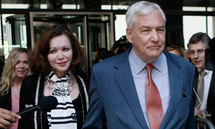Judge rules Conrad Black must stay in US for now
Dan Dorfman
CHICAGO, Dan Dorfman- Disgraced media mogul Conrad Black must remain in the United States after his release on a two-million-dollar bond until he provides more details of his financial assets, a judge ruled Friday.
US District Judge Amy St. Eve said Black would not be allowed to leave the country until he provided a fuller accounting of his financial assets.

Conrad Black
Black wants to return to Canada, where he was born, but St. Eve said he would have to remain in the United States for now, and scheduled an August 16 hearing for him to provide additional financial details.
The 65-year-old has served more than two years of a six-and-a-half-year prison sentence. He is appealing his fraud conviction on the basis of a Supreme Court ruling in his favor last month.
He said little during the 18-minute hearing, leaning in to confer with his lawyer at times as spectators looked on in the packed courtroom.
His attorney, Miguel Estrada, told the judge that Black preferred to return to Toronto during the summer instead of staying at his Florida home.
"There are some health issues with Mrs Black that make it unsuitable for the summer period," Estrada said. "So the only abode he has possible is in Toronto."
Black and his wife, Barbara Amiel, left the court hand in hand. His only comment to reporters, when asked how he was doing, was "tres bien" in French ("very well").
Black once ran the world's third largest media empire with such titles as Britain's Daily Telegraph and the Chicago Sun-Times.
Flamboyant in lifestyle and brutal in business, he counted politicians and popstars among his entourage as he built a towering newspaper empire.
But he was forced to quit as head of the Hollinger holding company when he was charged with siphoning off millions of dollars from the firm, notably when it began divesting its Canadian and US publications in 2000.
Black and his associates were convicted of stealing 3.5 million dollars by awarding themselves tax-free bonuses from the newspaper sell-offs, without the approval of Hollinger's board. They were accused of skimming off some 60 million dollars in all between 1999 and 2001.
But the US Supreme Court ruled last month that a 1998 law that allowed corporate bosses to be prosecuted for depriving shareholders of "honest services" had been too broadly interpreted.
The clause was a favorite tool for white-collar crime prosecutors precisely because of its broad language, but the highest court in the land ruled it could only be narrowly applied to cases involving bribery or kickbacks.
---------------------------------------------------------------------------